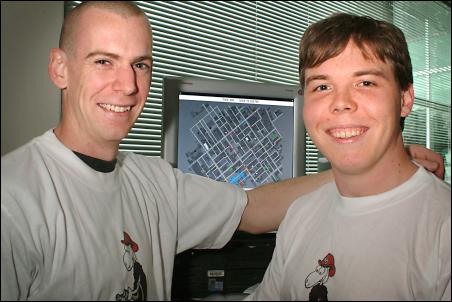Artificial intelligence Helping To Save Lives
Artificial intelligence students to compete in the international arena to save lives
University of Auckland PhD science students Cameron Skinner and Jonathan Teutenberg have been developing artificial intelligence programmes that could greatly assist the logistical planning of emergency units when a disaster strikes in New Zealand.

"By developing simulated programmes, we are able to learn how to coordinate emergency teams to better deal with a disaster such as an earthquake," says Cameron.
"At this stage the programmes are just that - simulations, but the ultimate goal is for these to develop to the stage of real-life programmes where robotic ambulances, fire trucks and police cars can be sent throughout a set geographical grid.
"5,000 people died in the Kobe earthquake in Japan in 1959 because there was no coordination of the emergency teams," says Cameron.
"We are developing an artificially intelligent programme that will be able to source the fires and road blockages, and then solve the problems in the quickest and most life-saving manner."
Cameron says while their programmes are still in the simulation stage, they could be used in the future to save thousands of lives in the event of a New Zealand disaster.
"For example, a recent report written by John Scarry said that many pre-cast concrete high-rise blocks built in New Zealand since 1994 do not comply with sound engineering practice and would collapse in a big earthquake," says Cameron.
Cameron and Jonathan's interest in artificial intelligence has been amplified by the International Robocup Rescue competition. Teams were require to submit an entry, and if successful would be invited to be a part of the competition.
Cameron and Jonathan represent the only team from the South Pacific competing in Padua, Italy this month against 20 other teams from around the world. Each team is given a simulation with a set of fires and road blockages. The team that is able to write software that solves the problem in the most life-saving manner is the overall winner.
"The individual programmes that we write are basically the agents within the simulated programme, just like the agents within the Matrix," says Cameron.
"Each fire truck, police car and ambulance is a difference agent requiring different programming - all of which have artificially intelligent links to one another to be able to best solve an emergency situation."
The University of Auckland has been sending teams over to the Robocup Rescue competitions for the past two years. Even though the teams have been competing against universities such as the Massachusetts Institute of Technology - who put the robot on Mars - they have always been placed in the top five.
"We are always challenged with regard to funding, but being part of a competition that develops such life-saving programmes is fantastic," says Cameron.
"Knowing that your programming may be used in the
future within New Zealand is even better."


 Jack Yan: A Farewell To Arms Re-released, In The Form Ernest Hemingway Intended
Jack Yan: A Farewell To Arms Re-released, In The Form Ernest Hemingway Intended Baycourt Community and Arts Centre: Talofa Papa - A Celebration Of Laughter, Love And Family
Baycourt Community and Arts Centre: Talofa Papa - A Celebration Of Laughter, Love And Family Bikesport NZ: 2025 Honda New Zealand Motocross Grand Prix At Woodville - Greatest Show On Turf A Memorial Event
Bikesport NZ: 2025 Honda New Zealand Motocross Grand Prix At Woodville - Greatest Show On Turf A Memorial Event Crohn's and Colitis NZ: Camp Purple Live 2025 - Celebrating A Decade Of Fun And Friendship For Kids And Teens With Inflammatory Bowel Disease
Crohn's and Colitis NZ: Camp Purple Live 2025 - Celebrating A Decade Of Fun And Friendship For Kids And Teens With Inflammatory Bowel Disease Creative Waikato: Building Wellbeing In Social Housing Through Creative Solutions
Creative Waikato: Building Wellbeing In Social Housing Through Creative Solutions The Conversation: ‘Cold Violence’ – A Hidden Form Of Elder Abuse In New Zealand’s Chinese Community
The Conversation: ‘Cold Violence’ – A Hidden Form Of Elder Abuse In New Zealand’s Chinese Community